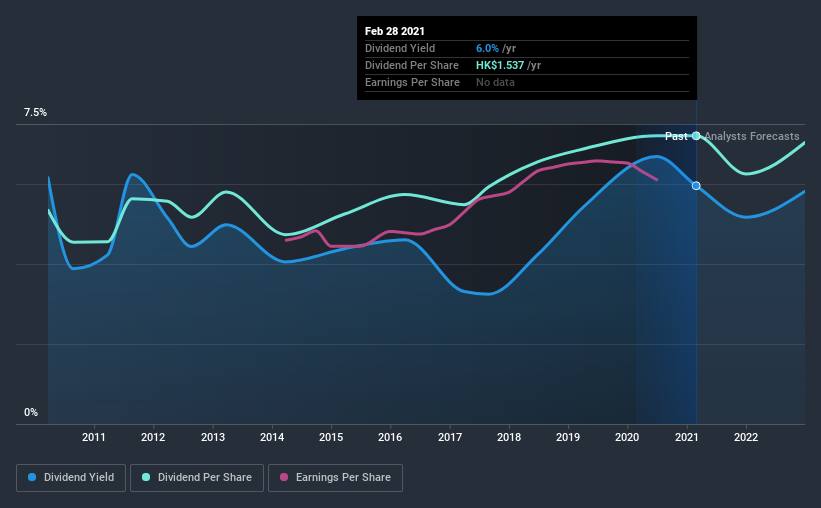Is BOC Hong Kong (Holdings) Limited (HKG:2388) A Smart Choice For Dividend Investors?

Could BOC Hong Kong (Holdings) Limited (HKG:2388) be an attractive dividend share to own for the long haul? Investors are often drawn to strong companies with the idea of reinvesting the dividends. Yet sometimes, investors buy a stock for its dividend and lose money because the share price falls by more than they earned in dividend payments.
A high yield and a long history of paying dividends is an appealing combination for BOC Hong Kong (Holdings). It would not be a surprise to discover that many investors buy it for the dividends. Some simple research can reduce the risk of buying BOC Hong Kong (Holdings) for its dividend - read on to learn more.
Explore this interactive chart for our latest analysis on BOC Hong Kong (Holdings)!

Payout ratios
Companies (usually) pay dividends out of their earnings. If a company is paying more than it earns, the dividend might have to be cut. As a result, we should always investigate whether a company can afford its dividend, measured as a percentage of a company's net income after tax. Looking at the data, we can see that 50% of BOC Hong Kong (Holdings)'s profits were paid out as dividends in the last 12 months. A payout ratio above 50% generally implies a business is reaching maturity, although it is still possible to reinvest in the business or increase the dividend over time.
Remember, you can always get a snapshot of BOC Hong Kong (Holdings)'s latest financial position, by checking our visualisation of its financial health.
Dividend Volatility
From the perspective of an income investor who wants to earn dividends for many years, there is not much point buying a stock if its dividend is regularly cut or is not reliable. BOC Hong Kong (Holdings) has been paying dividends for a long time, but for the purpose of this analysis, we only examine the past 10 years of payments. Its dividend payments have declined on at least one occasion over the past 10 years. During the past 10-year period, the first annual payment was HK$1.1 in 2011, compared to HK$1.5 last year. This works out to be a compound annual growth rate (CAGR) of approximately 3.0% a year over that time. BOC Hong Kong (Holdings)'s dividend payments have fluctuated, so it hasn't grown 3.0% every year, but the CAGR is a useful rule of thumb for approximating the historical growth.
Modest growth in the dividend is good to see, but we think this is offset by historical cuts to the payments. It is hard to live on a dividend income if the company's earnings are not consistent.
Dividend Growth Potential
With a relatively unstable dividend, it's even more important to evaluate if earnings per share (EPS) are growing - it's not worth taking the risk on a dividend getting cut, unless you might be rewarded with larger dividends in future. Earnings have grown at around 6.6% a year for the past five years, which is better than seeing them shrink! Earnings per share are growing at an acceptable rate, although the company is paying out more than half of its profits, which we think could constrain its ability to reinvest in its business.
We'd also point out that BOC Hong Kong (Holdings) issued a meaningful number of new shares in the past year. Regularly issuing new shares can be detrimental - it's hard to grow dividends per share when new shares are regularly being created.
Conclusion
To summarise, shareholders should always check that BOC Hong Kong (Holdings)'s dividends are affordable, that its dividend payments are relatively stable, and that it has decent prospects for growing its earnings and dividend. First, we think BOC Hong Kong (Holdings) has an acceptable payout ratio. Second, earnings growth has been ordinary, and its history of dividend payments is chequered - having cut its dividend at least once in the past. In summary, we're unenthused by BOC Hong Kong (Holdings) as a dividend stock. It's not that we think it is a bad company; it simply falls short of our criteria in some key areas.
Market movements attest to how highly valued a consistent dividend policy is compared to one which is more unpredictable. Still, investors need to consider a host of other factors, apart from dividend payments, when analysing a company. To that end, BOC Hong Kong (Holdings) has 2 warning signs (and 1 which shouldn't be ignored) we think you should know about.
Looking for more high-yielding dividend ideas? Try our curated list of dividend stocks with a yield above 3%.
When trading BOC Hong Kong (Holdings) or any other investment, use the platform considered by many to be the Professional's Gateway to the Worlds Market, Interactive Brokers. You get the lowest-cost* trading on stocks, options, futures, forex, bonds and funds worldwide from a single integrated account. Promoted
Valuation is complex, but we're here to simplify it.
Discover if BOC Hong Kong (Holdings) might be undervalued or overvalued with our detailed analysis, featuring fair value estimates, potential risks, dividends, insider trades, and its financial condition.
Access Free AnalysisThis article by Simply Wall St is general in nature. It does not constitute a recommendation to buy or sell any stock, and does not take account of your objectives, or your financial situation. We aim to bring you long-term focused analysis driven by fundamental data. Note that our analysis may not factor in the latest price-sensitive company announcements or qualitative material. Simply Wall St has no position in any stocks mentioned.
*Interactive Brokers Rated Lowest Cost Broker by StockBrokers.com Annual Online Review 2020
Have feedback on this article? Concerned about the content? Get in touch with us directly. Alternatively, email editorial-team (at) simplywallst.com.
About SEHK:2388
BOC Hong Kong (Holdings)
An investment holding company, provides banking and related financial services to corporate and individual customers in Hong Kong, China, and internationally.
Solid track record with excellent balance sheet and pays a dividend.

